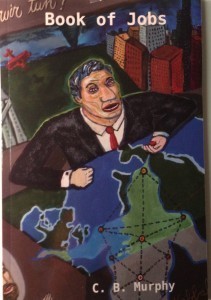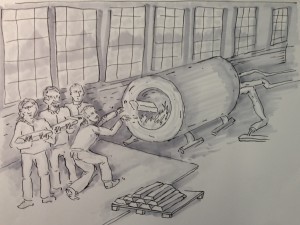Four Questions on My Writing Process
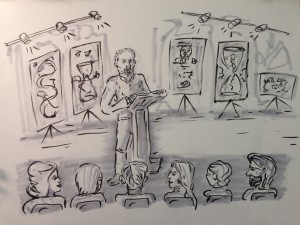
Question #1: What am I working on now?
I have a second draft of my third novel sitting on my desk right now. It’s very different from anything I’ve done before. My earlier books were both mainstream fiction, though the first one CUTE EATS CUTE I’ve started calling “YA” because of the fifteen-year-old narrator.
The book I’m working on is called BARDO ZSA ZSA. When I am pressed for a quick explanation of it, I ask people if they’ve read Kurt Vonnegut. Why? Because Vonnegut wrote funny, satirical, philosophical fiction that only “happened to be” science fiction because he allowed himself the freedom to use that genre as content. That’s how I see BARDO ZSA ZSA.
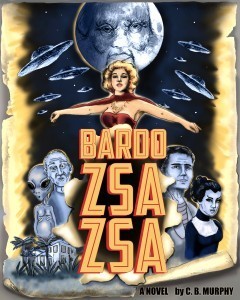
The story is about the “survivors” of the Heaven’s Gate suicide cult who find themselves on the UFO, but not exactly, the one they wanted. The conditions on the ship are far from what they imagined they would be. Far from a utopia run by friendly Space Brothers who look like they come from Sweden.
Instead, creatures much closer to “classic” aliens put the group on trial to represent earth and give them reasons not to destroy it. Our key characters are selected to be tested to see if our species is interesting enough not being destroyed by the world-weary jaded aliens. The “tests” place the characters inside of 1950s “B” science fiction movies where they have to figure out why they are there and how they might achieve an earth-saving result from the situation.
Our main character learns to love for the first time and believes this human capacity is the “missing ingredient” that would convince the aliens to spare the earth. You’ll have to read the book to find out what happens.
I am planning to illustrate the book with drawings and paintings done by the main character (a technique Vonnegut also used).
Taking a break from BARDO ZSA ZSA’s edit, I am also completing my first memoir—BOOK OF JOBS. I started it as a simple way to tell to my college age sons about all about the jobs I have done. I think there are seventeen. Each story will be illustrated with a cartoon (I call them “New Yorker cartoon style”) and a short, funny story (think David Sedaris). Some of by friends are reading the draft and telling me it’s the best thing I’ve written. They’ve convinced me to put it out as a “real book.”
Question #2: How does my work differ from others in its genre?
This is a good question for me as each of my books so far is in a different genre. That’s not what they tell you to do in “Writing School.” My books come from things I want to write about, and while I admire genre writers (and wish I could do it), I have to write what I have to write. My first book (Cute Eats Cute) was positioned as mainstream, character-driven fiction but because my fifteen-year-old character’s voice “took over” the story, it became more of a coming-of-age (YA) novel than I anticipated. When it first came out, I avoided that moniker but now I embrace it.
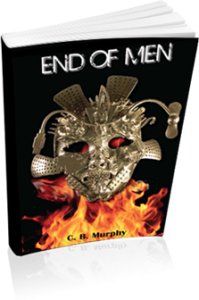
My second novel END OF MEN is clearly for adults—a mainstream (dare I say literary?) novel about a group of people who were once wild in college and as they grew older all went different directions. It covers a lot ground from suburban Chicago and the financial district, to a feminist museum, and finally to “art’ filmmaking on an Italian island. This is where all the characters get together again and deal with who they were and who they are now. Wild things happen.
My third book (BARDO ZSA ZSA) is tough to categorize. Technically, it could be considered “speculative fiction” (a funny phrase literary authors use when they write science fiction but they don’t want their work placed next in the “rayguns and spaceships” section.) I’d still call it mainstream fiction due to it’s focus on character.
Question #3: Why do I write what I do?
I had a writing coach once who gave some very good advice (I don’t think it was even his). He said a writer should find a doorway in his or her life that they never went through. Send your character through that door! This way you have the personal motivation to finish your story, as it is also a voyage of self-discovery. I think motivation for writing is very important and is best when it comes from a very personal place. Writing is just too difficult and the results too unpredictable to have motivations for fame and fortune sustain you.
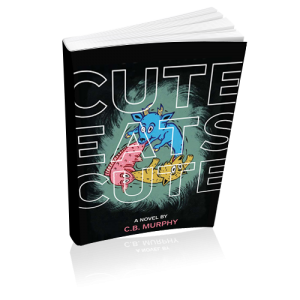
My first novel CUTE EATS CUTE was an exploration of what it’s like to be a young person growing up in our politically divisive culture. It was also a way for me as a father to explore how I wanted to influence my sons. How would I handle the differences I have with their mother (still my wife FYI), for example? Despite finally calling it a YA novel, my real reason for writing was to explore being a parent. I think humor comes rather easily to me (despite my son saying, “Dad, you aren’t as funny as you think you are”) so CUTE is pretty darn funny if I say so myself. It’s funny in the way I think everyday life is funny, which is dark-funny or as it’s been described “Coenesque” (and not just because I live in Minnesota).
END OF MEN, my second novel, my “grown-up” novel, is partly autobiographical. I was “wild” in college and in fact went “straight” (as they used to call it) into a business career while keeping one foot in the world of creativity (cartooning, painting, writing). The older I got the more my “wilder” creative side sort of came back and took over, so much so that people who know me today only know me as a creative and are surprised to find out I once sold industrial metals, yes, in a “suit.” Part of my motivation for END OF MEN was exploring how my life turned out the way it did especially when some of my friends never went “straight,” never veered off the identity of the creative. Years later, even with this history of being a “suit,” I retained a burning interest in making things.
Where did BARDO come from? I was in the middle of writing another book (in a way a prequel to BARDO called LAND SOMEWHERE ELSE) when I veered off course. LAND was about people whose loved ones had gone into a cult. I had at least one solid draft of it when I started to lose interest. I realized that I was writing for an imaginary audience who was “not me,” wondering if this would be a story other people would like. It occurred to me, given where I was at in my life, that it was time to write something just for me and if anyone else liked it, fine. And fine if they didn’t. So BARDO has become the place to play, a place where I write exactly what I want to. Of course, I would still love it if others appreciate it, but I would be able to handle it if they didn’t. This is partly something I learned from painting—how to do it for myself and how that can motivate me to finish something. And delight in creating.
Question #4: How does my writing process work?
Process. Interesting. Well, for starters, I’m fairly disciplined. I usually write five or more “sessions” a week (usually weekdays), often two sessions a day. Despite all my talk about “playing,” I do work quite hard at it. As for how the writing process works, I fall into the camp of figuring it out as I go. Having said that, I spend a lot of time “mapping out” (mind mapping software) questions, characters, plot points, etc. I go tangents of research. What is perhaps the most difficult thing, I let my book take on a life of its own and tell me where “it” wants to go. Sometimes I even “interview” characters like I’m a director and they’re an actor who has been hired to play the character. This allows them to tell me things like, “My character wouldn’t do that.” I often take their advice. This keeps the work alive and separate from my “day mind” intentions for it, allowing magic to come in.
Then I edit. I like to say that each stage of a writing project has its own demons and they’re different. First Draft Demons say things like, “This is dumb. Don’t you have anything more fun to do? Who do you think you are anyway?” Editing Demons say things like, “Gosh, this is hard. Why didn’t you just write it better the first time?” Or: “If you can’t write better than this there’s really nothing you can do to fix your work. Isn’t there anything else you’re good at?” So, one fights the specific demons. And if you’re lucky, you get to the end. To other demons. Don’t get me started.

